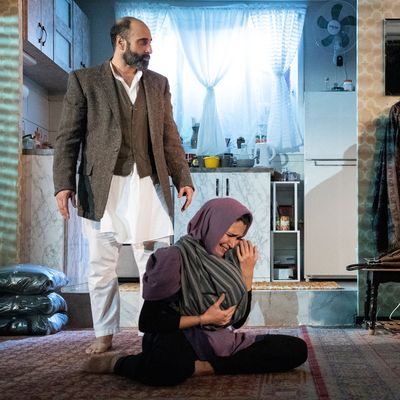
The smaller of the two theaters at Playwrights Horizons has always reminded me of a screening room. Tucked upstairs, it’s a wide shallow space — a rectangle of roughly Cinemascope proportions — and the theater often uses it to produce closely observed, realistic work. Sylvia Khoury’s elegant new play Selling Kabul looks perfectly at home in this filmic space, using the compression of the tight frame to create a ratcheting sense of tension. Arnulfo Maldonado’s hyperdetailed set of an apartment in Afghanistan is exactly realized: beige carpet, low ceiling, a plaster archway into a small, cluttered kitchen. Light streams in between slatted blinds, slicing the room into film noir stripes. Everything in the furniture-free room is beige or brown, but it’s easy to imagine Khoury’s psychological drama as a black-and-white thriller.
From the moment we see Taroon (Dario Ladani Sanchez) alone in the apartment, we know he’s in trouble. He’s sitting on the floor shaking an internet router, trying to get it to work, but he’s moving in a furtive, frightened hush. Why can’t he take the antennae to the window if he’s having trouble getting a signal? He crawls around out of sight, keeping low. When his sister, Afiya (Marjan Neshat), comes home, we learn why Taroon is in hiding: His earlier translation work for American forces has made him a target of the Taliban. His wife’s pregnancy has prevented him from fleeing the country, but Afiya has come back from the hospital with news that his son has been born. Now Taroon will finally stop waiting for word from the army guys who were supposed to send him a visa (“America, their word is good, okay?” he insists to a skeptical Afiya), and make a break for it — as long as he can get through the night alive.
At first, Sanchez and Neshat seem artificial together. There’s a constraint between them — and Sanchez’s Taroon moves recklessly and speaks too loud. Why can’t he remember his character’s in hiding? I thought. But director Tyne Rafaeli has choreographed her actors precisely. Taroon himself is chafing at the bounds of his confinement, so the siblings are deliberately out of sync with each other, hampered by the many things they cannot say. And Rafaeli wants us to get annoyed at Taroon every time he slams a door or wanders unthinkingly past a window. She turns us into a whole room full of shushing Afiyas, desperate to make him quiet, controlled, safe.
As the play’s 90 minutes grind forward, the fragile sanctuary trembles like a water droplet; we sense it is about to fly apart. Small things loom large. Neighbor Leyla (Francis Benhamou) comes by for an unending, unwelcome chat. Afiya seems to be concealing something, though she and her husband Jawid (Mattico David) insist that everything in the baby’s ward at the hospital is fine. Khoury’s ear is particularly attuned to the stifling conversations of the truly close. In her hands, even familiarity and kindness become dangerous. Leyla’s gentle insistence that her lifelong friend can confide in her begins to ring false, and Taroon can’t bear to have a keeper, so old habits of rebellion against a know-it-all sister may doom him. Afiya herself wants to keep her conscience clean, but we can see her world has turned into a scramble in the mud. It isn’t a question of whether blood will stain her, but whose.
Rafaeli does an excellent job of making the world beyond the apartment seem a real threat. When light moves against the kitchen window, we all cringe. Any noise, even the hum of the air conditioning, seems menacing. (Jen Schriever and Alex Fetchko designed the lights; Lee Kinney designed the subtle sound.) It’s this outside world, after all, that’s exerting its terrible pressure on the family’s quiet little room. Outside the apartment is a constricting ring of Taliban; beyond the city is a hostile countryside; beyond the country is a bewildering storm of countries and borders and refugees and broken promises. There’s a section late in the play when Jawid tells Taroon that he regrets the compromises he has made to keep his family protected — he feels he has sold his country for safety. It’s one of the few unintentionally awkward exchanges in the play, partly because we hear the thud of the title slotting into place, partly because the moment seems too urgent for such arty soul-searching. Yet it does point to Khoury’s strategy of showing us a hell (of our American making) at its atomic level. In a world of invasions and drone strikes and militias, what could it matter what happens in one little apartment? It matters, Khoury says, because these are the forces that build the world — one terrified nucleus at a time.
Selling Kabul is at Playwrights Horizons through December 23.


